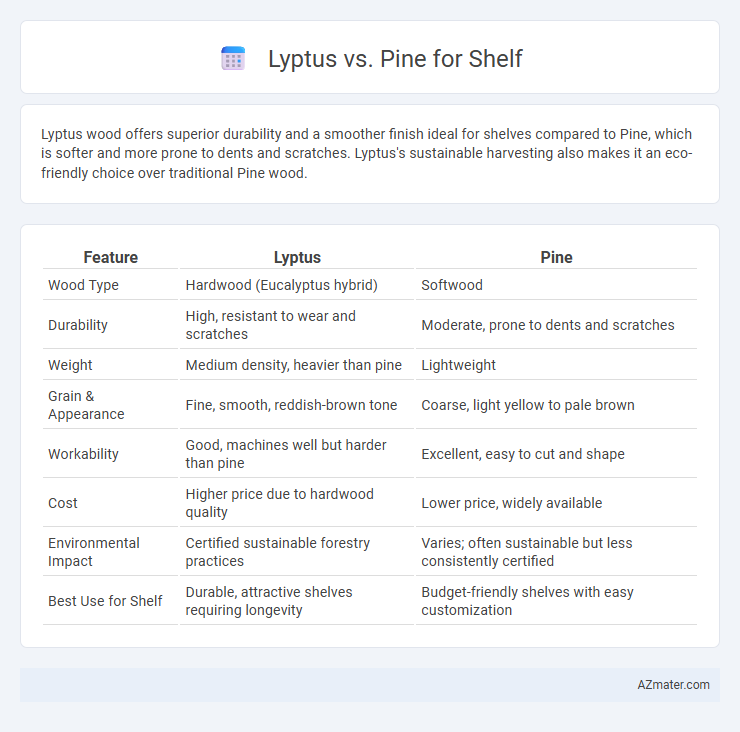Lyptus wood offers superior durability and a smoother finish ideal for shelves compared to Pine, which is softer and more prone to dents and scratches. Lyptus's sustainable harvesting also makes it an eco-friendly choice over traditional Pine wood.
Table of Comparison
| Feature | Lyptus | Pine |
|---|---|---|
| Wood Type | Hardwood (Eucalyptus hybrid) | Softwood |
| Durability | High, resistant to wear and scratches | Moderate, prone to dents and scratches |
| Weight | Medium density, heavier than pine | Lightweight |
| Grain & Appearance | Fine, smooth, reddish-brown tone | Coarse, light yellow to pale brown |
| Workability | Good, machines well but harder than pine | Excellent, easy to cut and shape |
| Cost | Higher price due to hardwood quality | Lower price, widely available |
| Environmental Impact | Certified sustainable forestry practices | Varies; often sustainable but less consistently certified |
| Best Use for Shelf | Durable, attractive shelves requiring longevity | Budget-friendly shelves with easy customization |
Introduction to Lyptus and Pine for Shelving
Lyptus, a sustainable hardwood hybrid derived from Eucalyptus species, offers exceptional strength and durability ideal for shelving compared to traditional pine. Pine, a softwood known for its affordability and ease of machining, is commonly used in shelving but is more prone to dents and scratches. Lyptus provides a harder, denser surface with a smooth grain, making it resistant to wear and suitable for both functional and decorative shelves.
Wood Characteristics: Lyptus vs Pine
Lyptus wood is a hybrid eucalyptus known for its high density and hardness, offering superior durability and resistance to dents compared to the softer, more porous pine. Pine features a lighter color with prominent grain patterns, making it easier to stain but more prone to scratches and dents. Lyptus provides a smoother finish and greater stability due to its uniform texture, while pine's resin content can cause challenges in finishing and may require more maintenance over time.
Strength and Durability Comparison
Lyptus offers superior hardness and resistance to wear compared to pine, making it an excellent option for shelves requiring high durability. Pine, while softer and easier to work with, is more prone to dents and scratches over time, reducing its long-term strength. The dense grain structure of Lyptus enhances load-bearing capacity, ensuring longer-lasting shelf performance under heavy use.
Aesthetic Appeal and Grain Differences
Lyptus wood features a consistent, fine grain with a smooth texture and a warm reddish-brown hue that enhances the aesthetic appeal of shelves. Pine, on the other hand, displays a more pronounced grain pattern with knots and a lighter, creamy-yellow color, giving shelves a rustic and natural look. The choice between Lyptus and pine depends on whether a refined, uniform appearance or a distinctive, character-rich grain is preferred.
Workability and Ease of Installation
Lyptus offers superior workability compared to pine due to its consistent grain and hardness, allowing for smoother cutting and sanding with less splintering. Pine, being a softer wood, is easier to drill and nail, but can be prone to dents and damage during installation. Shelf construction benefits from Lyptus's durability and minimal warping, while pine's lightweight nature simplifies handling but may require more careful finishing.
Environmental Impact and Sustainability
Lyptus wood, derived from a hybrid of Eucalyptus species, offers rapid growth and sustainable plantation management, reducing deforestation pressure compared to traditional hardwoods. Pine, commonly sourced from native forests or plantations, varies in sustainability based on regional forestry practices, with well-managed pine forests supporting carbon sequestration and biodiversity. Lyptus typically requires fewer pesticides and less water, presenting a lower environmental footprint than some pine varieties grown in intensive agricultural systems.
Cost Analysis: Lyptus vs Pine
Lyptus wood generally incurs a higher initial cost compared to pine due to its denser grain and durability, which reduces long-term maintenance expenses for shelves. Pine offers a budget-friendly option with lower upfront material costs, though it might require frequent repairs or refinishing because of its softness. Considering lifecycle expenses, Lyptus can be more cost-effective for high-traffic shelving, while pine suits projects with tight budget constraints but lighter use.
Finishing Options and Maintenance Needs
Lyptus offers a smooth, fine grain surface that accepts stains and finishes evenly, providing a durable and glossy appearance, while pine's softer texture absorbs stains irregularly and often benefits from clear or light finishes to highlight its knots and natural character. In terms of maintenance, Lyptus requires minimal upkeep and resists dents and scratches better, making it ideal for high-use shelves, whereas pine may need more frequent refinishing or touch-ups due to its susceptibility to dents and wear. Selecting Lyptus ensures long-lasting, low-maintenance shelves with consistent finish quality, whereas pine offers a rustic look but demands higher maintenance to preserve its appearance.
Ideal Applications for Each Wood Type
Lyptus wood, known for its dense grain and rich reddish hue, is ideal for high-end shelving that requires durability and a smooth finish, making it perfect for modern and contemporary interiors. Pine, with its lighter color and softer texture, suits rustic or casual shelving where cost-effectiveness and ease of customization are prioritized. Pine's natural knots and grain patterns add character to decorative shelves, while Lyptus resists wear and moisture better, enhancing shelf longevity in humid environments.
Choosing the Best Wood for Your Shelves
Lyptus wood offers a dense, durable option for shelves with a smooth grain, providing superior resistance to wear compared to Pine. Pine, a softwood, is more affordable and easier to work with but is prone to dents and scratches, making it less ideal for heavy-duty shelving. Selecting Lyptus ensures long-lasting strength and a refined appearance, while Pine suits budget-conscious projects where ease of customization is a priority.

Infographic: Lyptus vs Pine for Shelf
 azmater.com
azmater.com